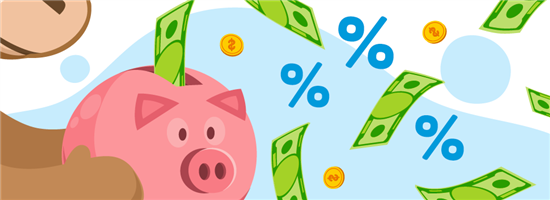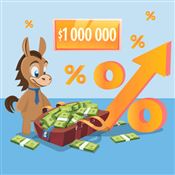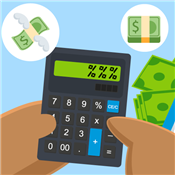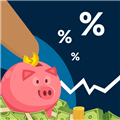3 Percent Interest Savings Account
Ad Disclosure: This article contains references to products from our partners. We may receive compensation if you apply or shop through links in our content. This compensation may impact how and where products appear on this site. You help support CreditDonkey by using our links.
Looking for a way to earn without much effort? Check out these 3% high-yield savings accounts to get you started.
 |
- CIT Bank Platinum Savings:
$300 Bonus - Axos ONE:
Earn up to 4.31% APY - Valley National Bank:
High-Yield Savings Account - 3.95% APY - Western Alliance Bank:
High-Yield Savings Premier - 3.90% APY - Mission Valley Bank:
High Yield Savings Account - 3.86% APY - Live Oak Bank:
Personal Savings - Earn 3.80% APY - UFB Freedom Checking & Savings:
Unlock Up to 3.60% APY - Quontic:
High Yield Savings - 3.50% APY
Best 3% Interest Savings Accounts
Currently, banks are offering even higher APYs. Here are some savings accounts with the best rates:
CIT Bank Platinum Savings - $300 Bonus
- Qualify for a $300 cash bonus with a minimum deposit of $50,000
- This limited time offer to qualify for a $225 cash bonus with a minimum deposit of $25,000 or a $300 bonus with a minimum deposit of $50,000 is available to New and Existing Customers who meet the Platinum Savings promotion criteria. The Promotion begins on September 23, 2025 and can end at any time without notice.
UFB Portfolio Savings - Earn up to 3.40% APY
- Earn up to 3.40% APY.*
- No monthly maintenance fees.
- No minimum deposit required to open an account.
- Access your funds 24/7 with easy-to-use digital banking tools.
- Enjoy peace of mind with FDIC insurance up to the maximum allowance limit – Certificate #35546.
High-Yield Savings Premier - 3.90% APY
- No account fees
- Option to open individual or joint account
- FDIC insured up to $250,000 per depositor
- Only $500 minimum opening deposit
High Yield Savings Account - 3.86% APY
- $1 minimum deposit
- No fees
- 24/7 online access to funds
- FDIC insured
Axos ONE - Earn up to 4.31% APY
- Earn up to 4.31% APY* on savings, and 0.51% APY* on checking when you meet requirements.
- Get your money up to 2 days early.
- No monthly maintenance, minimum balance, account opening, or overdraft fees.
High-Yield Savings Account - 3.95% APY
- $1 minimum deposit
- No fees
- 24/7 online access to funds
- FDIC insured
Personal Savings - Earn 3.80% APY
- Earn 3.80% APY
- No minimum balance requirement
- No monthly service fee
Empower Personal Cash
- 3.00% APY
- $0 monthly fee
- Withdraw up to $100k per day
How Much Do You Earn With A 3% Interest Savings Account?
You can slowly grow your money with a 3% interest savings account. Use this calculator to check how much you can earn:
Here's a table of how much you would have with 3% interest and different monthly contributions:
| Monthly contribution | 1 year | 3 years | 5 years |
|---|---|---|---|
| $1,000 Initial Deposit | |||
| $0 | $1,030 | $1,093 | $1,159 |
| $100 | $2,230 | $4,802 | $7,530 |
| $300 | $4,630 | $12,220 | $20,272 |
| $500 | $7,030 | $19,638 | $33,014 |
| $1,000 | $13,030 | $38,184 | $64,869 |
| $5,000 Initial Deposit | |||
| $0 | $5,150 | $5,464 | $5,796 |
| $100 | $6,350 | $9,173 | $12,167 |
| $300 | $8,750 | $16,591 | $24,909 |
| $500 | $11,150 | $24,009 | $37,651 |
| $1,000 | $17,150 | $42,554 | $69,506 |
| $10,000 Initial Deposit | |||
| $0 | $10,300 | $10,927 | $11,593 |
| $100 | $11,500 | $14,636 | $17,964 |
| $300 | $13,900 | $22,055 | $30,706 |
| $500 | $16,300 | $29,473 | $43,448 |
| $1,000 | $22,300 | $48,018 | $75,302 |
| $20,000 Initial Deposit | |||
| $0 | $20,600 | $21,855 | $23,186 |
| $100 | $21,800 | $25,564 | $29,556 |
| $300 | $24,200 | $32,982 | $42,298 |
| $500 | $26,600 | $40,400 | $55,040 |
| $1,000 | $32,600 | $58,945 | $86,895 |
Can You Lose Money In A 3% Savings Account?
If your bank or credit union is FDIC-insured or NCUA-insured, you won't have to worry about losing money in your savings account.
Deposits are protected by the federal government up to $250,000 per depositor, per ownership category. This means you're insured up to $250,000 for individual accounts and up to $500,000 for joint accounts.
Additionally, you can lose money due to fees from failure to meet minimum balance requirements.
Pros and Cons of a 3% Savings Account
Here are the pros and cons of a 3% interest savings account:
Pros:
- Earn money passively
- Easy access to your funds
- Low-risk investment
- Easy to open an account
- Savings are FDIC-insured up to $250,000
Cons:
- APY tends to fluctuate
- Mostly offered by online-only banks
- Usually limited to 6 withdrawals per monthly cycle
- Possible monthly service fee
- Possible opening deposit or balance requirements
Alternatives To 3% Savings Accounts
If you're still on the fence about opening a high-yield savings account, here are some alternatives you can consider:
Certificate of Deposit
A Certificate of Deposit is best if you can commit to locking up your money for a period of time. In exchange, you get a fixed APY for the entire term. So you get guaranteed returns even if market conditions change.
Unlike with a high-yield savings account, you won't be able to access your funds until it matures. Should you need to withdraw early, you'll be subject to a penalty.
- Western Alliance Bank:
High-Yield CD Rates - Up to 3.60% APY - CIT Bank No Penalty CD:
3.25% APY - Quontic:
6 Month CD - 3.75% APY - Consumers Credit Union:
10-Month Super Jumbo CD - 3.85% APY - Sallie Mae Bank:
14-Month No Penalty CD - 3.40% APY - Citizens Bank:
7-Month CD - 3.80% APY - Ally Bank:
6-Month CD - 3.90% APY - Associated Bank:
7-Month CD - 3.50% APY - Popular Direct:
12-Month CD - 4.00% APY - Charles Schwab Bank:
3-Month CD - Up to 3.86% APY
Money Market Account
Money market accounts are similar to savings accounts, but they may offer more flexibility. Some come with an ATM or debit card, and let you write checks and pay bills.
However, the downside is that some banks may require you to make a large initial deposit or to maintain a certain balance.
- UFB Portfolio Money Market:
Earn up to 3.40% APY - Ally Bank:
Money Market - 3.30% APY - Quontic:
Money Market Account - 4.10% APY - EverBank Performance℠ Money Market:
Up to 3.80% APY - Prime Alliance Bank:
Personal Money Market Account - 3.75% APY - Affinity Plus Credit Union:
Superior Money Market - Up to 3.40% APY - Vio Bank:
Money Market Savings Account - 4.31% APY - Sallie Mae Bank:
Money Market Account - 3.70% APY
High-Yield Checking Account
A high-yield checking account is a good option if you want to earn interest on your checking balance.
You can get a decent APY along with easy access to your funds through a debit card.
- Axos Bank:
Rewards Checking - Up to 3.30% APY - UFB Freedom Checking & Savings:
Unlock Up to 3.60% APY - GSL Savings Bank:
6-Month CD - 3.35% APY
Is A 3% Savings Account Right For Me?
Savings accounts with 3% interest are ideal if you want to store your money in a safe place while earning passively. It can help you boost your funds through competitive rates.
It's good for emergency funds or if you have a short-term financial goal you want to achieve. You'll get easy access to your money, so you can withdraw anytime you need to.
In comparison to a traditional savings account, one with 3% interest is definitely better. It's higher than the national average savings rate of 0.39% APY, so it's a decent way to slowly boost your money.
Bottom Line
Putting your funds in a high-yield savings account is a good way to make your money work harder for you. It can help you increase your pace when you're saving up for short-term financial goals.
Compare savings accounts to get the highest APY possible, so you can reach your goals faster.
- CIT Bank Platinum Savings - $300 Bonus
- UFB Portfolio Savings - Earn up to 3.40% APY
- Western Alliance Bank:
High-Yield Savings Premier - 3.90% APY - Mission Valley Bank:
High Yield Savings Account - 3.86% APY - Axos ONE - Earn up to 4.31% APY
- Quontic:
High Yield Savings - 3.50% APY - Valley National Bank:
High-Yield Savings Account - 3.95% APY - Live Oak Bank:
Personal Savings - Earn 3.80% APY
Darlene Santos is a research analyst at CreditDonkey, a bank comparison and reviews website. Write to Darlene Santos at darlene.santos@creditdonkey.com. Follow us on Twitter and Facebook for our latest posts.
Note: This website is made possible through financial relationships with some of the products and services mentioned on this site. We may receive compensation if you shop through links in our content. You do not have to use our links, but you help support CreditDonkey if you do.
|
|
|













